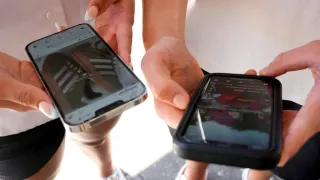August 6, 2017
Data Shed Light on LGBT Retirees
Matthew S. Bajko READ TIME: 8 MIN.
Growing up in southern Florida, and spending much of his young adult years in Orlando, Larry Burlew, Ph.D., always intended to spend his retirement years in the Sunshine State. In 2009, he bought a condominium in Daytona Beach for that very purpose.
So when he retired in 2014 from his career as a university counseling professor, having taught at several schools in the Northeast, Burlew moved back south. He was near his family, as his relatives live in cities on Florida's East Coast along the Atlantic Ocean.
"I was actually looking forward to retirement," said Burlew, 67, in a recent phone interview. "It is just nice not to have to get up early."
What he didn't take into account was how many of Daytona Beach's gay residents have migrated in recent years to the city of Fort Lauderdale. The winnowing out of the local LGBT community for other locales resulted in the closure of gay bars and other LGBT establishments as their customer base shrank.
"There used to be a lot of gay people in Daytona Beach," Burlew recalled.
Today, there are no gay bars left. The local Hamburger Mary's, a chain of restaurants long associated with the LGBT community, attracts a mostly straight crowd, said Burlew.
"That has been a big thing to adjusting to living in Daytona. I have not easily found gay life," said Burlew, who is single. "I have tried the internet before but don't particularly like it. I haven't had a lot of success dating and meeting gay men. I was a little surprised this was an area no longer quite so gay-oriented as it used to be."
Because his family is nearby, Burlew doesn't consider himself to be lonely. And he is still in contact with gay friends who live elsewhere. But he does miss living in an area with a sizeable gay population, so he bought a small house in Fort Lauderdale with his sister in order to visit there for weeks at a time.
"I have given that some thought and did think about moving down to Fort Lauderdale. But I don't think I want to do that," he said. "It is so much cheaper up here to live, and I like that it is a slower pace."
One issue he does grapple with is accepting that his body is aging as he does. Where once he would never consider having a facelift, Burlew acknowledged it is something he is now contemplating.
"One of my harder transitions with aging is just, at some point, I was used to having men be attracted to me physically. With a changing body, it doesn't happen as often as it used to," said Burlew, who maintains a regular gym regimen. "I am adjusting to that and have to work harder at it."
Social isolation and ageism are issues that many LGBT older adults encounter in retirement, as a growing body of academic papers and health research has documented. It is an example of the insights LGBT advocates, health officials, and policymakers gain when demographic information about the LGBT community is collected.
For example, a 2015 study published in Social Science & Medicine based on data collected from 312 gay-identified men aged 48 to 78 participating in the Multicenter AIDS Cohort Study found that "internalized gay ageism" - feeling denigrated or depreciated because of aging in the context of a gay male identity - is associated with negative mental outcomes.
The Aging with Pride: National Health, Aging, and Sexuality/Gender Study, the first national study of LGBTQ adults 50 years and older that the National Institutes of Health first funded in 2009, is providing a wealth of data and insight into numerous aging issues within the LGBT community.
As for data specifically on LGBT retirees, "there is more needed," said Colleen Logan, Ph.D., a lesbian and the program coordinator at the School of Counseling and Social Services at Walden University who was the first out president of the American Counseling Association.
Catherine Roland, Ph.D., who stepped down this spring as ACA president, agreed.
"I am not saying there is no research but not a lot is going on of a national mental health scale," said Roland, 70, a lesbian who recently moved to New Orleans and opened a private counseling practice.
In order to ensure the health issues and other needs of LGBT people of all ages are not ignored, there is a growing movement within the LGBT community to demand government records and surveys ask participants about their sexual orientation and gender identity (SOGI).
In California and San Francisco, officials are aiming to make answering SOGI questions on various forms and medical documents a matter of routine, as the Bay Area Reporter reported last month. Across the country there is a growing call for LGBT data to be collected at the local, state, and federal levels on all manner of surveys, studies, and government forms.
"It is extremely important, it is essential. There is no way without data that we can get the funding to provide the services that are so critical," argued Jill Gover, Ph.D., a psychologist and director of the Scott Hines Mental Health Clinic at the LGBT Center of the Dessert in Palm Springs.
According to SAGE, short for the national advocacy group Services and Advocacy for LGBT Elders, there are more than 2.7 million LGBT adults aged 50 or older in the U.S. Yet aging service providers are unprepared to meet the health needs of this demographic group, as detailed in the report "Understanding Issues Facing LGBT Older Adults" that SAGE and the Movement Advancement Project released in late May.
A key finding of the report was that data and research on LGBT seniors "are more crucial than ever" in order to identify and address how the discrimination and stigma older LGBT adults have faced impacts a whole host of issues, from health care to housing to employment.
"As the baby boomer generation reaches retirement age, it is clear that we are woefully unprepared to provide for the needs of older LGBT adults," stated MAP Executive Director Ineke Mushovic.
Focusing a spotlight on the mental health needs of LGBT people, particularly older adults, was Roland's main initiative during her term as president of the counseling association. The organization recently released a 98-page "Guide for Counseling LGBTQ Adults Across the Lifespan" and in June brought 250 people together for a symposium on the mental health issues facing LGBT people across their adult life spans.
"Old people get forgotten anyway. People in our community get forgotten even more," said Roland, who edited the guide for counselors with Burlew.
Unprepared for Retirement
Gover cautioned that many LGBT people themselves have not prepared for retirement.
"Retirement is not what they imagined it would be," said Gover, 63, a lesbian and former Bay Area resident who relocated to Palm Springs in 2010 and a year later established the clinic at the community center. "Retirement is not an easy thing."
Gay men, in particular, can find adjusting to retirement a challenge, said Gover, when they leave behind successful careers and positions of responsibility.
"Suddenly, they don't have that anymore and so much of their self-esteem was tied to work and employment," said Gover, who was trained this year by SAGE to build LGBT cultural competency in organizations that work with older adults. "They find themselves a little lost when they lose that anchor."
Many people, no matter their sexual orientation, have tied their identity to their work life and can find adjusting to retirement a challenge. But LGBT retirees face particular challenges, noted Logan.
"All of a sudden you wake up one day and you no longer have that workplace. What is significantly different for LGBT folks retiring is the affect of homoprejudice," said Logan, 52, a lesbian who lives in Dallas. "Let's say at work, and for this generation retiring, I set my private life and work life separate. That can certainly enhance isolation when you leave work and make no friends of any kind to bridge between your social and work self. That can be really enhanced for someone LGBT."
Aging comes with all manner of loss, explained Gover, that many people are unprepared to deal with.
"It could be the loss of a partner or the loss of a job and the identity that comes with it. Also, financial loss can happen where you are living on less money than you did when working fulltime," she said. "You are having to pay more attention to your financial situation. And loss can be related to health issues and mobility. People find it is more difficult when they have less energy and more difficult to get out and about to meet people."
LGBT retirees who relocate to a different city can find it can be a difficult adjustment, said Gover. They leave behind the support networks they've established with friends and/or family members for an environment where they may know no one.
"What I think happens is there is also a social connection that we create in our place of employment that is also lost when people retire in a new location. So when they come down here and adjust to a new life, sometimes they find themselves more isolated than they expected."
Because these issues are triggers for depression in older adults, Gover launched the Cognitive Behavioral Therapy for Late Life Depression program, funded by the Riverside County Department of Mental Health, at the center's clinic. It serves up to 100 clients per week and, since launching seven years ago, demand has been steady.
"We have a tsunami of boomers who are retiring, which means there is a steady flow coming to Palm Springs who are gay. The demand is here because this is an ongoing issue," she said. "It is something we all face on some level, and people need some help and some guidance along the way for adjusting to a new life."
Stay Active
To ward against feeling isolated or depressed, LGBT retirees are advised to stay active and engaged in their community.
"I think there are a couple of very important questions people need to ask themselves before they make a decision to retire. The first is how am I going to structure my time," said Gover. "That seems to be a recurrent theme. People are so focused on and can't wait to stop working but haven't thought about what they are going to do instead. What is going to happen when they wake up in the morning?"
Retired since 2001, gay Cathedral City resident Bruce Hume, 73, volunteers with nonprofits to keep busy. The former director of a social work department for a large physical and medical rehabilitation hospital, Hume staffs the reception desk at the local LGBT community center.
"I think it has been a challenge to keep my days busy and mind active and, at the same time, enjoy my retirement," said Hume, who had lived in Long Beach before moving out to the Palm Springs area. "I had an opportunity to go back to work but I would have had to be there every morning at 8 a.m. and I don't want to do that. At the center, I can pick my days and have my mornings. I think it is important to keep your mind active."
While his partner passed away some years ago, he already had friends living in the Coachella Valley, long a retirement mecca for gay men, prior to moving there.
"I have had a lot of men come into the center who are new to the Palm Springs area and say it is hard to meet people out here," said Hume, who advises them to look beyond the local bar scene to find community. "I had support here. I can't imagine coming here alone and being stuck in the house with no place to go."
This article is the last of three looking at LGBT data collection and was written as part of a California Health Journalism Fellowship project with the University of Southern California-Annenberg Center for Health Care Journalism.






